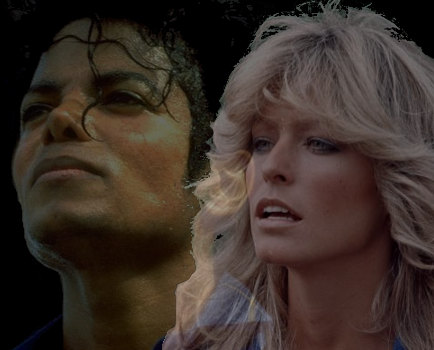
The greatest recording artist of all time and the dominant fantasy woman of two decades of American life died today, Thursday, June 25, 2009. On the way to their rest, they followed not too far behind the hero of Kung Fu, a man who himself had become enough of a mystery that a great film was built around metacasting him.
When Bea Arthur passed, I felt I lost someone I knew. As a performer, she connected with people on the level of a cogent internal and external identity. She crafted human characters in a way that reinforced our mutual humility and dignity. Performers often comfort us by shedding light on the mysteries of identity and stitching together the broken parts of our common experience. Watching Bea Arthur act, and hearing she died, made it easy to be human.
Losing Michael Jackson like this, Farrah Fawcett like this, and David Carradine like this does no such thing.
We go to bat for our idols, our fantasy folks — we defend them from their detractors, we fill in the gaps in our understanding of them (after all, we rarely know them personally, and even when we do, we cannot know the lives of their minds) with our own conjecture.
At times, maybe we fantasize that by upholding them or praising them, we benefit ourselves, like when we cheer at sporting events. At times, we pretend to ourselves that we know them or are friends with them when we do not and are not. And yet that bond still has social force — it is still real despite its limitations or thin justification. (For example, I don’t agree that Shepard Fairey’s iconic Obey Giant is an empty signifier that satirizes a form. Andre the Giant does, in fact, have a posse. There are no doubt members of it among this site’s readership.)
When our idols fall, it is painful. It feels as a personal loss.
When our idols do things we are ashamed of, it can hurt us.
But when our idols’ lives so depart from our notions of what they represent and narrativize (and I mean this both in what they do and what they endure, what they choose and what they suffer) that cogency is lost — that our imaginations of them tear away, that the chaos and multideterminism of human nature are laid bare without even as much cogency as I have just lent them.
That’s when things get crazy.
Or should I say, that is when the angst between fantasy and reality becomes poignant, sumblime—almost unbearable.
I will not go through and catalogue the personal merits and challenges of Mr. Carradine and Ms. Fawcett — their great dignities followed by their great final indignities. But the central theme remains — we come to rely on people as fantasies, and while it is one thing for a fantasy to collapse and fail, it is another for it to shatter so painfully and suddenly as to call into question the very cogency we lent it in the first place.
This is not on them. This is on us. These pictures are not of the people as they lived. They are of the people as we imagined them.
I wish I had it in me to write a proper eulogy for any of these three people, but the discontinuities are too great — narrativizing it feels false. And I feel I have little insight into their souls.
The best manner of Overthinking I can offer them as we reflect on their passing is how much deeper and more mysterious — or perhaps more primordially void — that chasm was between who we thought they were and who they really were turned out to be.
